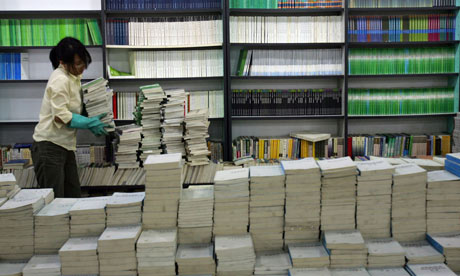
Professor Jin Di, Chinese translator of Ulysses, and Annette Schiller,
SALIS and the Irish Translators' and Interpreters' Association
Last Thursday and Friday saw an important event in the calendars of
both Dublin City University and the Irish Translators' and Interpreters'
Association (ITIA): the visit of Prof. Jin Di to Ireland to receive
honorary membership of the ITIA and to give an open lecture at the
Second DCU International Postgraduate Translation Studies Conference.
Though famous for his work as both a teacher and translation
theorist, it is for his translation of James Joyce's Ulysses that
Professor Jin is most famous. A full account of his epic, 16-year task
of translating the masterpiece is available at http://www.ctts.dcu.ie/pg-ulysses.htm.
Now aged of 84, he remains sprightly and continues to work as a
translator. His latest project is the translation of his late friend
Richard Ellmann's biography of James Joyce.
The Thursday evening ceremony was held in the Irish Writers' Centre
on Parnell Square and was introduced by ITIA Chairperson and DCU
lecturer Annette Schiller, who welcomed Professor Jin to Dublin. This
was then followed by a brief account of Professor Jin's life and work
given by John Kearns, also of the ITIA and the Centre for Translation
and Textual Studies at DCU. Next, the Ambassador of the People's
Republic of China to Ireland, His Excellency Dr Sha Hailin spoke of the
importance of Jin Di's work to the improvement of Sino-Irish relations
and commended him for his translation, not just of Ulysses, but of many
other literary works and for his contribution to the theory of literary
translation in works such as Literary Translation: Quest for Artistic
Integrity (which was available on the evening courtesy of Jin Di's
publisher Ken Baker of St. Jerome Press, who had travelled from
Manchester for the occasion).
Finally Professor Jin was conferred with honorary membership and
presented with a certificate, the citation on which acknowledged his
"creative and scholarly achievements, especially his translation of
James Joyce's Ulysses into Chinese, adding a new universal dimension to a
work of Irish and European culture." He gratefully acknowledged the
honour and then gave a fascinating and highly entertaining lecture
entitled "Literature and Exoticism" featuring many examples quoted from
his own translation of Ulysses. The theme of the lecture centred on a
reassessment of the notion of `dynamic equivalence' associated with
Professor Jin's collaborator, the renowned translation theorist Eugene
Nida. The talk was warmly received.
The following day, Professor Jin addressed an audience of around a
hundred delegates and others at an open plenary lecture at DCU held as
part of the Second DCU International Postgraduate Translation Studies
Conference and organised by young researchers and postgraduate students
from the Centre for Translation and Textual Studies in the School of
Applied Language and Intercultural Studies. The title of this lecture
was "The Paradox of Creative Translation" and the subject was an
examination of a specific kind of creativity in literary translation,
the kind that produces a text which contains material apparently
different from those in the source text. In what proved to be a
fascinating talk, Professor Jin posed questions such as "Are all
`creative translations' justifiable?", "What exactly are the situations
that call for such `creative translations'?", and most specifically "How
can one create translations that are apparently different from the
original and yet manage to carry the sophisticated and sometimes
extremely elusive qualities of the original art over to the readers in
the new language as closely as possible?" The complications involved in
addressing these issues were illustrated with examples chosen from his
two recent books Shamrock and Chopsticks: Joyce in China, a Tale of Two
Encounters (Hong Kong: City University of Hong Kong Press, 2001) and the
aforementioned Literary Translation: Quest for Artistic Integrity
(Manchester: St. Jerome, 2003). Again the lecture was warmly received
and provided much material for discussion at the conference dinner in
the Helix afterwards, at which Professor Jin provided further
entertaining discussion of his work and ideas.
Both of the above events were organised and co-funded by the DCU
Postgraduate Society, the Centre for Translation and Textual Studies at
DCU, and by the Irish Translators' and Interpreters' Association.
John Kearns
Centre for Translation and Textual Studies, Dublin City University.
dari http://www.dcu.ie/news/2005/apr/s0405a.shtml //6 April 2005


